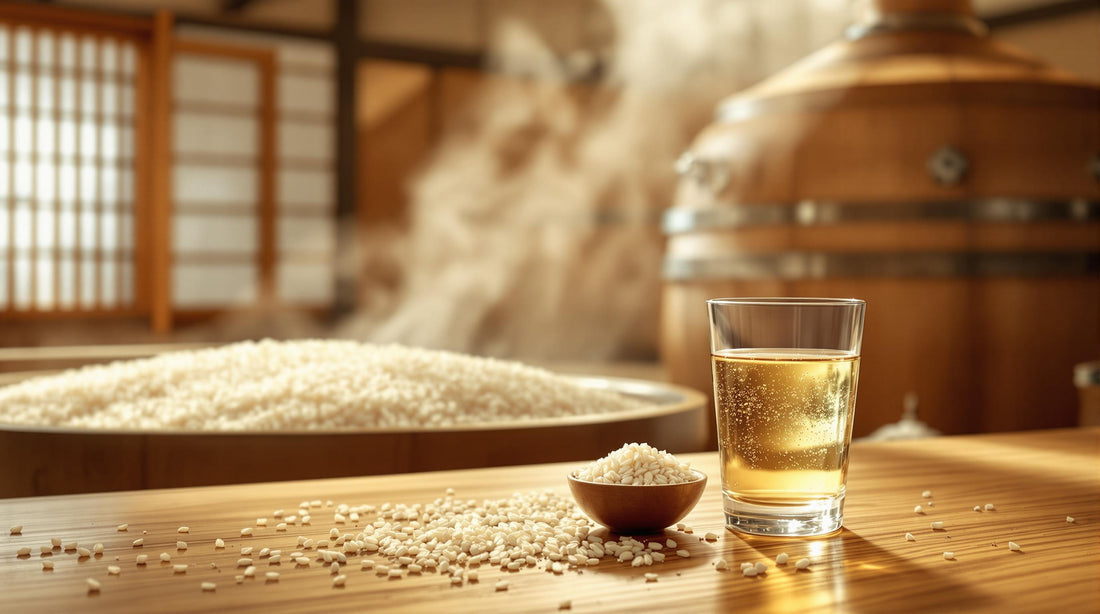
What Is Junmai Sake?
Share
Junmai sake is a type of Japanese sake made with only four ingredients: rice, water, yeast, and koji mold. Unlike other sake types, it contains no added alcohol or additives, which keeps it pure and rice-focused. Here's what you need to know:
- Flavor: Bold, umami-rich, and earthy with a smooth texture.
- Rice Polishing Ratio: Typically 70% (30% of the rice grain is polished away).
-
Varieties:
- Junmai: Full-bodied, robust, with earthy notes.
- Junmai Ginjo: Lighter, fruity, and floral.
- Junmai Daiginjo: Silky, aromatic, with refined melon and pear flavors.
-
Serving Temperatures:
- Warm (45-55°C) for robust flavors.
- Room temperature for balanced notes.
- Slightly chilled for delicate, refined varieties.
- Food Pairings: Matches well with dishes like grilled seafood, miso soup, sashimi, and salads.
Junmai sake's brewing process emphasizes traditional craftsmanship, focusing on rice polishing and fermentation to create its signature rich and clean taste. Whether you’re new to sake or an enthusiast, Junmai offers a versatile and flavorful experience.
Junmai-shu Styles of Sake and Non-Junmai Styles of Sake: The Truth About The Differences
Brewing Process of Junmai Sake
The brewing of Junmai sake is a detailed process that highlights its bold flavors and pure rice essence, showcasing centuries of Japanese expertise.
Rice Selection and Polishing
The journey starts with carefully chosen sake rice, which undergoes a process called seimai buai (rice polishing ratio). At least 30% of the outer layer of each rice grain is polished away, leaving 70% of the core intact. This step removes proteins, fats, and minerals that could alter the flavor [1].
Fermentation Process
Once polished, the rice is steamed and combined with koji mold. This mold plays a key role by breaking down rice starches into fermentable sugars [1][2]. Temperature control during this stage is critical, with brewers maintaining a range of 10-15°C to encourage yeast activity while preventing bacterial interference. The fermentation process typically lasts around 20 days [2][6].
Multiple Parallel Fermentation
Junmai sake stands out due to its distinctive multiple parallel fermentation method. This unique process simultaneously converts rice starch into sugar and ferments it into alcohol, unlike most brewing methods that handle these steps separately [2][5].
The ingredients are added gradually over four days, allowing layers of complexity to build in the sake's flavor. Once fermentation is complete, the mixture, known as moromi, is pressed to separate the liquid sake from the solid sake-kasu (lees) [2].
This detailed brewing process is what gives Junmai sake its clean character and wide range of flavors.
Types and Flavors of Junmai Sake
Flavor Profile of Junmai Sake
Junmai sake is known for its rich, full-bodied character that highlights the pure essence of rice. Its flavor profile often includes umami-rich notes, with earthy and nutty undertones adding depth [1][5]. A subtle sweetness balances the bold flavors, creating a harmonious taste.
Traditional brewing methods like Yamahai and Kimoto bring out more acidity and amplify the umami, while modern techniques result in cleaner, more refined flavors [5]. These unique tastes are influenced by factors like rice polishing and fermentation methods, giving each type of Junmai sake its own distinct personality.
Varieties of Junmai Sake
The rice polishing ratio plays a key role in defining the character of each Junmai sake, from the boldness of Junmai to the refined elegance of Junmai Daiginjo. Here's a breakdown:
| Classification | Rice Polishing Ratio | Flavor Characteristics |
|---|---|---|
| Junmai | 70% | Full-bodied, robust with pronounced umami and earthy notes |
| Junmai Ginjo | 60% | Lighter body, fruity and floral notes, smooth finish |
| Junmai Daiginjo | 50% or less | Silky texture, highly aromatic with melon and pear notes, elegant finish |
The polishing ratio directly impacts the flavor. A higher ratio (more polishing) leads to a more delicate and refined profile [1][4]. While Junmai retains its bold and robust nature, Junmai Daiginjo stands out for its aromatic complexity and smooth texture [4][5].
Serving temperature also plays a big role in how the flavors are experienced. Traditional Junmai varieties are often best served warm (45-55 degrees Celsius), which enhances their robust and earthy qualities [5]. This flexibility makes Junmai sake perfect for a variety of occasions and personal tastes.
sbb-itb-d9fb1bc
Enjoying Junmai Sake
To truly appreciate Junmai sake, it helps to know the best ways to serve and pair it with food. These choices can elevate your experience and bring out the sake's distinct flavors.
Serving Junmai Sake
The temperature at which you serve Junmai sake can dramatically influence its taste. Here's a quick guide:
| Type | Best Temperature | Flavor Highlights |
|---|---|---|
| Traditional Junmai | Warm (45-55°C) | Brings out earthy tones and umami |
| Junmai Ginjo | Room temperature | Enhances fruity and floral characteristics |
| Junmai Daiginjo | Slightly chilled | Maintains its delicate, aromatic profile |
For warm sake, using a tokkuri (a traditional sake carafe) not only keeps the sake at the right temperature but also helps concentrate its aromas [1].
Pairing Junmai Sake with Food
Junmai sake's rich umami flavors make it a perfect match for a variety of dishes. Consider these pairings:
- Traditional Junmai: Pairs well with hearty options like grilled seafood, yakitori, braised pork belly, or earthy dishes such as miso soup and roasted mushrooms.
- Junmai Ginjo: Complements lighter dishes like sashimi, white fish, or delicately flavored cuisine.
- Junmai Daiginjo: Works beautifully with nuanced flavors in salads or lightly seasoned dishes.
Matching the intensity of the sake with the dish is key. For instance, warm Junmai sake (45-55°C) pairs wonderfully with grilled meats and hot dishes, creating a balanced and enjoyable meal [1]. Meanwhile, room-temperature sake offers flexibility, making it suitable for a wide range of foods.
Discovering Junmai Sake with The Sake Company

The Sake Company connects sake lovers with traditional breweries, offering tools and experiences to deepen their appreciation for Junmai sake - a classic and beloved beverage.
Sake Selections and Discovery Boxes
The Sake Company’s discovery boxes provide a curated introduction to Junmai sake. Each box includes guides that cover everything from the sake’s origin and brewing methods to its flavor notes, serving suggestions, and ideal food pairings. These thoughtfully crafted selections make premium sake easy to explore and enjoy.
Here are two standout options:
- Tsuchida Box ($215): Features a variety of Junmai styles from one well-known brewery.
- Hiraizumi Seasonal Box ($178): Focuses on seasonal Junmai offerings from Akita.
Connecting with Artisanal Breweries
The Sake Company gives enthusiasts a chance to dive into the world of Junmai sake by offering direct access to artisanal breweries and their unique creations. Their curated selections, along with a detailed sake book and platform, provide valuable insights into Junmai’s regional styles and traditional brewing methods. Whether you’re new to sake or a seasoned fan, these resources help you better understand and enjoy this exceptional drink.
Conclusion
Junmai sake showcases the art of brewing with just four ingredients: rice, water, yeast, and koji mold. Its careful production process brings out a rich, full-bodied taste with noticeable acidity and a strong rice-forward profile [1][3].
If you’re new to Junmai sake, experimenting with different serving temperatures can be eye-opening. Warmth, in particular, can deepen its flavors and highlight its complexity. It’s also a great companion for a variety of dishes, complementing both Japanese meals and global cuisines effortlessly.
Junmai sake offers a broad spectrum of experiences, from the straightforward appeal of standard Junmai to the refined layers of Junmai Daiginjo [1][4][5]. Companies like The Sake Company provide curated selections that allow you to explore both traditional and modern takes on this timeless drink.
Whether you’re a seasoned sake lover or just starting out, Junmai sake invites you to dive into its diverse styles and serving possibilities, offering an authentic glimpse into Japan’s sake-making tradition.
